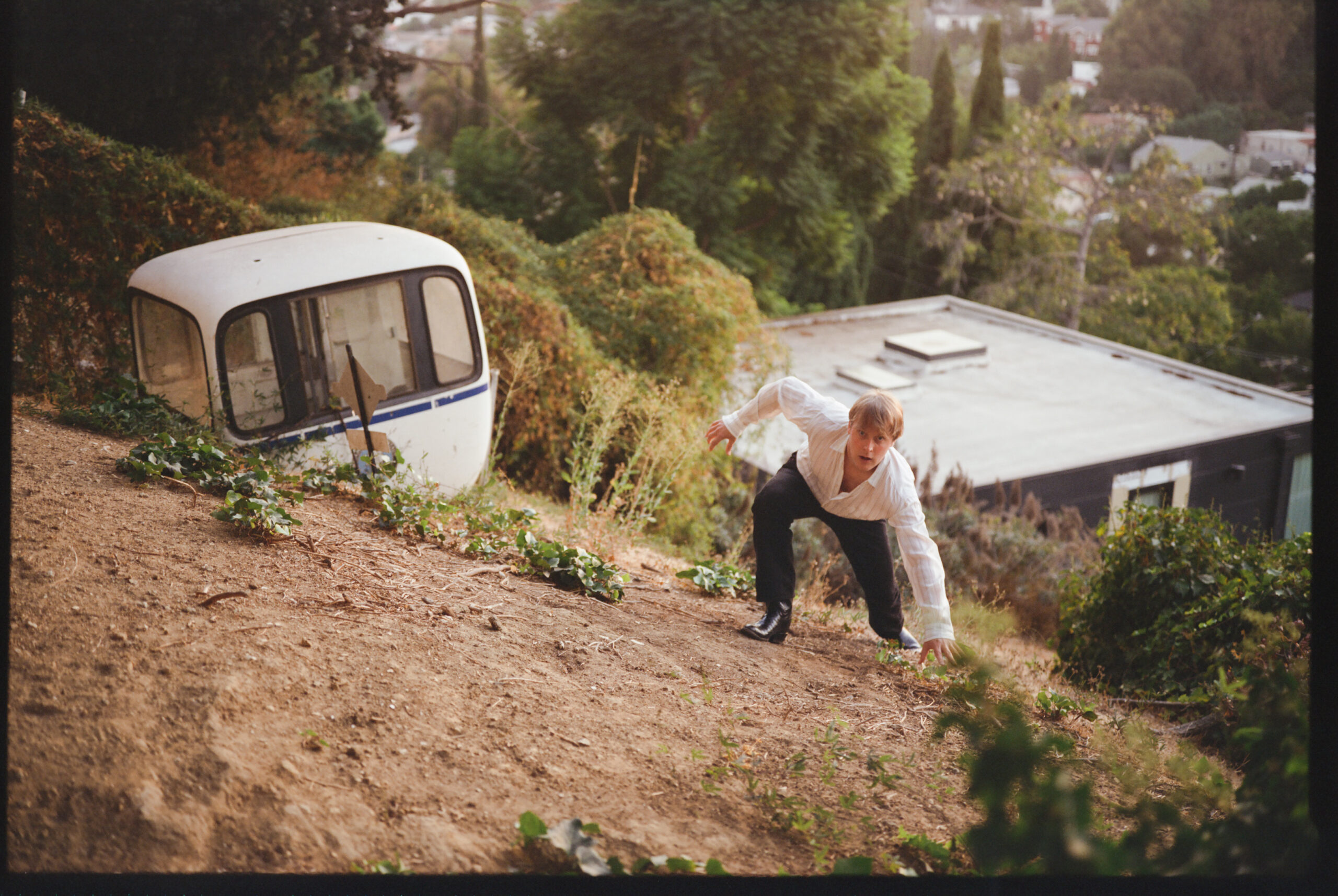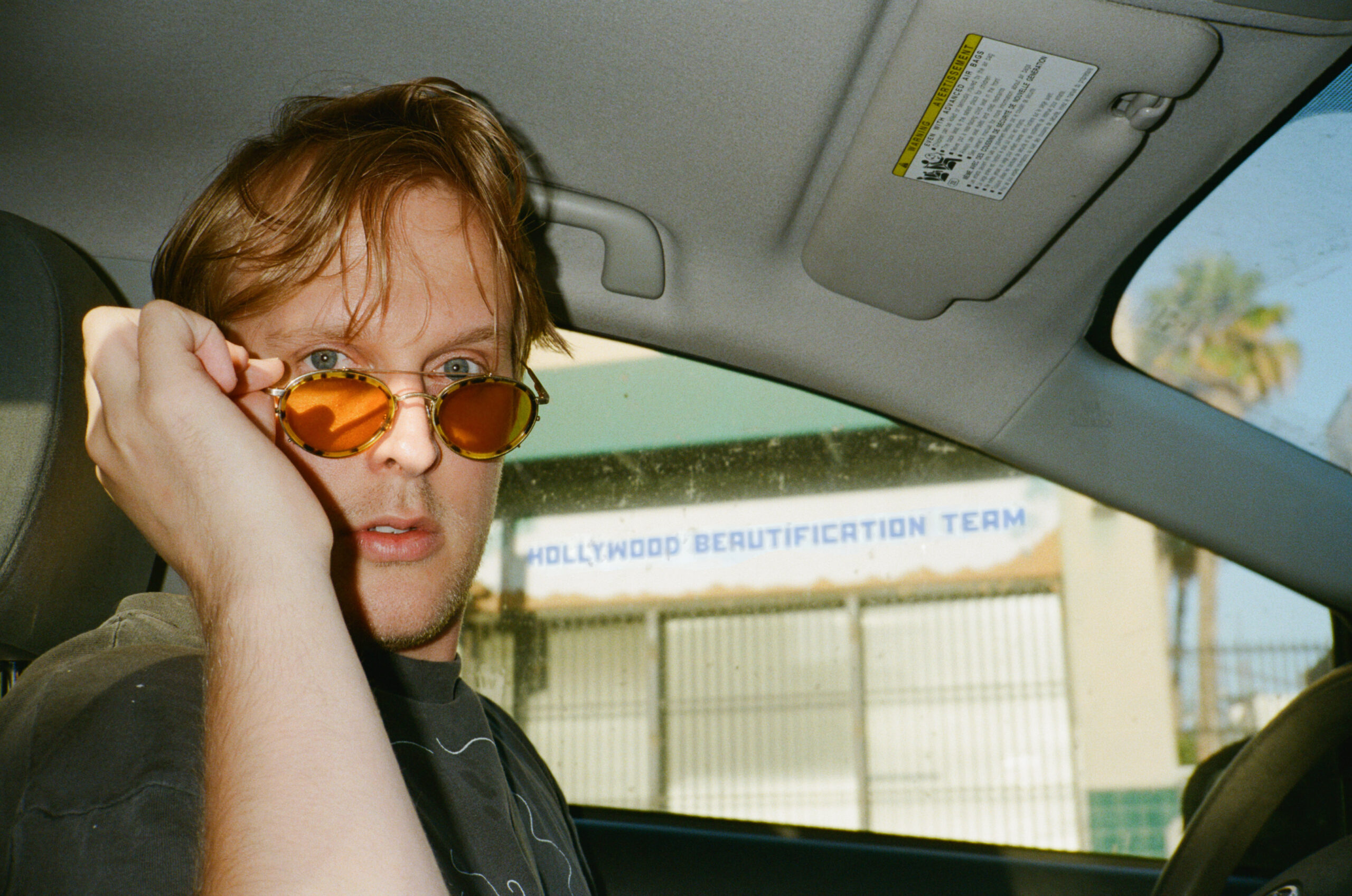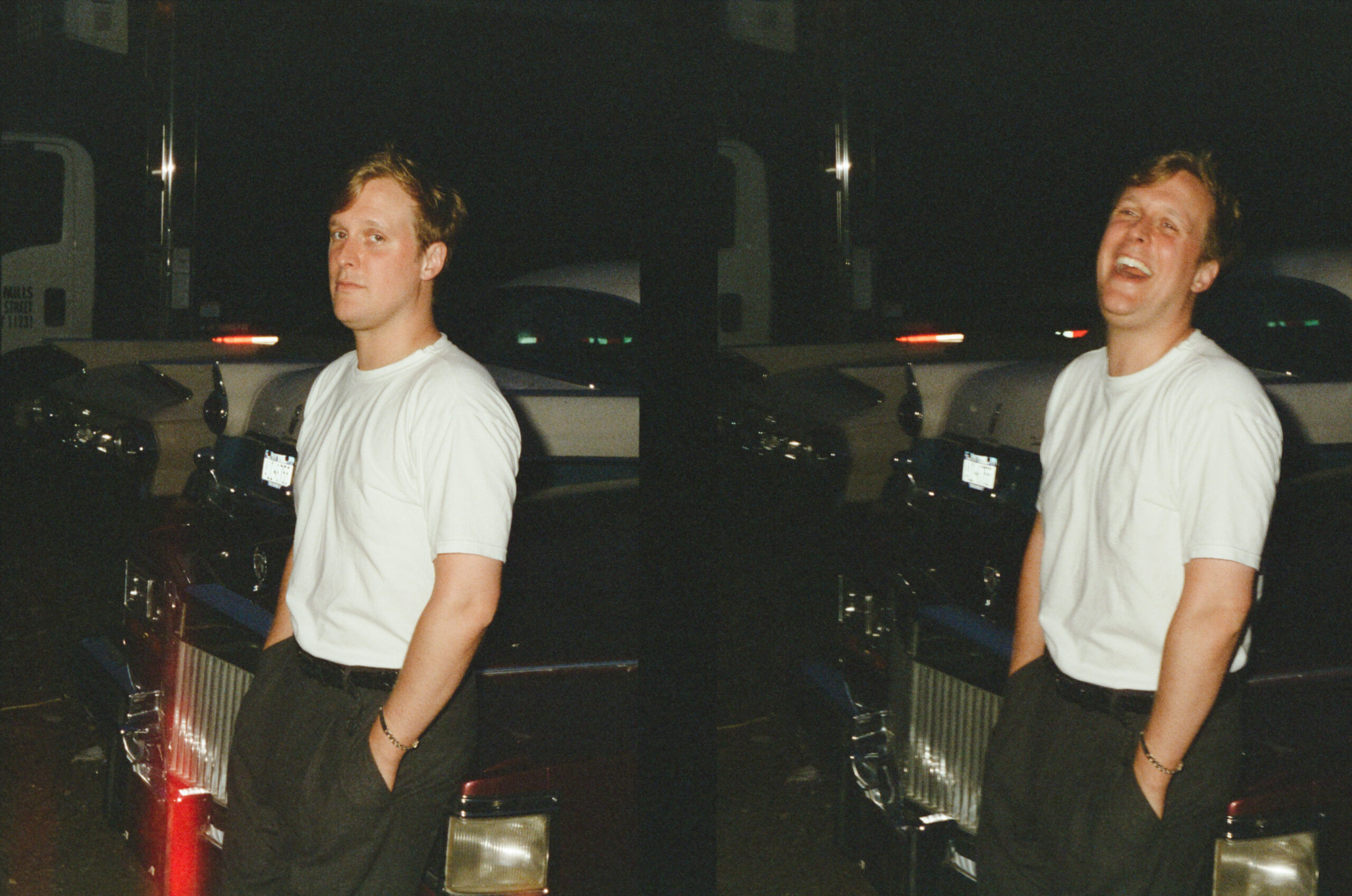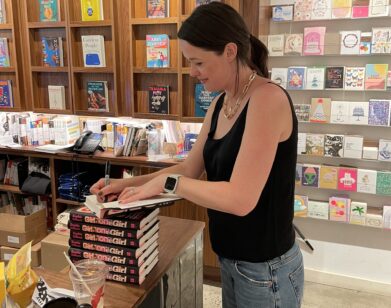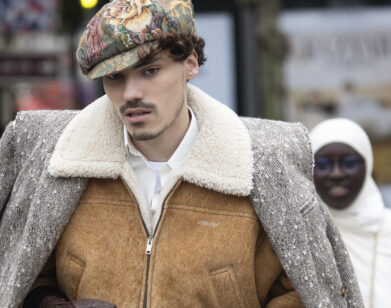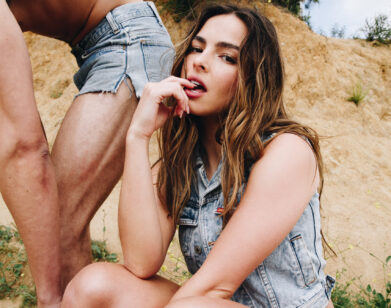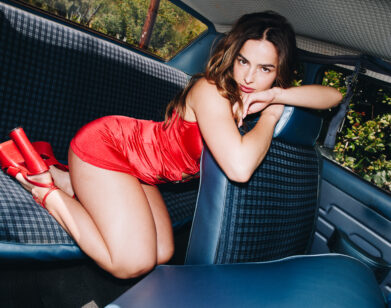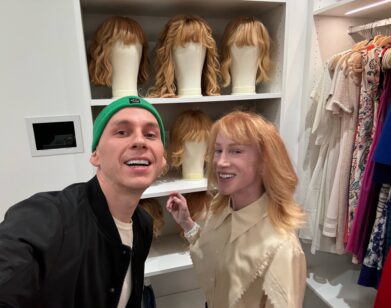pop
“Are You Gay?”: John Early, in Conversation With Sky Ferreira
As of last week, John Early, one of the funniest and most influential comedians of his generation, has an album of covers, originals, and stand-up called Now More Than Ever available on every legitimate streaming service known to man. But please, don’t call him a singer, or assume he thinks he has the chops for it. “If you’re singing, then the subtext is you’re trying to show off your voice,” he told Sky Ferreira last week. “And I would rather die than have people think that.” But the truth of the matter is that Early can sing, as evidenced by his covers of hits by Britney Spears, Aaliyah, Neil Young, and Donna Summer, each delivered on the razor sharp edge of sincerity and irony that Early loves to toe. “You bring the songs to life in a way,” says Ferreira, who got together with Early over drinks at The Dresden to talk about his foray into music. “You actually notice the nuance of the songs in the cover.” Very quickly, their conversation evolved into a sort of pop music symposium, as the two explained why Kelis is criminally underrated, gushed over early 2000s Madonna, and detailed all the food mentioned in Barbra Streisand’s tome of a memoir.
———
JOHN EARLY: We’re live from The Dresden.
SKY FERREIRA: Hi.
EARLY: Let it also be on the record that it’s 11:45.
FERREIRA: Is it?
EARLY: Yeah, and there’s no one from Interview present, so we’re getting back to their bohemian roots. Where do we begin?
FERREIRA: Well, I listened to your whole album. I’ve watched everything. I did a deep dive.
EARLY: I’m truly honored.
FERREIRA: I didn’t listen to the most recent interviews of yours—
EARLY: Don’t. They’re hell.
FERREIRA: I know. It’s just always weird because of the way someone might present you when they edit it. It’s sabotage. Anyways, so what is it like to be… are you gay?
EARLY: I’m glad you asked because I was hoping to use this press cycle to finally come out. Yes, I am gay.
FERREIRA: Tell me about your background growing up. No, I’m kidding. We don’t need to know any of that. How many Britney songs have you covered? I know there’s one on the album.
EARLY: There’s one on the album. I’ve probably done around nine covers.
FERREIRA: What are the names?
EARLY: The first one was always “I’m Not a Girl.”
FERREIRA: Crossroads?
EARLY: From Crossroads, baby. And then we did “Lucky” and “Crazy.” “Oops!…I Did It Again.” I did “Overprotected” a lot, which is what led it to being in the special. I’ve never done “Hit Me Baby One More Time,” because that feels too—
FERREIRA: On the nose?
EARLY: Yeah. The more famous the songs, the less they work live. They’re too obvious. You start to feel like a wedding band.
FERREIRA: The thing about covers is that they’re either too on the nose, or they try to be ironic with it. Yours don’t feel ironic.
EARLY: Thank you. I mean, the intention is to be sincere, but I am always fighting my own kind of knee-jerk irony.
FERREIRA: You stay true to the song without making it literal.
EARLY: Thank you. That’s the beautiful thing about covering something that has really dense pop production and then doing it with a very small band.
FERREIRA: But it doesn’t sound “coffee shop” when you do it. It doesn’t sound like open-mic.
EARLY: Yeah. It doesn’t sound like an A24 horror trailer.
FERREIRA: Well, at least it doesn’t sound like a Netflix one. That’s even worse. It’s almost like dubstep or something.
EARLY: Yes.
FERREIRA: I watched Search Party for the first time recently.
EARLY: Woah. Did you finish it?
FERREIRA: Yes. I watched the whole thing.
EARLY: Oh my god. I’m thrilled.
FERREIRA: I loved it. The hats.
EARLY: You have to understand, I was actually wearing those hats.
FERREIRA: It’s so funny, because that was a very specific kind of person at that time. Well, I’m just late to everything. Or I’m early to things that are old that people like later on. I’m stuck.
EARLY: I completely relate. I’ve listened to four songs for 200 years. I’ve listened to one Kelis album for 62 years.
FERREIRA: Which one?
EARLY: If I’m being honest, it’s Tasty. But I am completely, deeply madly in love with Kaleidoscope, the first one, and Wanderland. It was from 2001, but they didn’t release it in the US.
FERREIRA: Kelis has been fucked. I’d just like to put that on record. Kelis has been sabotaged and she’s so wildly underrated.
EARLY: Kelis is so important to me.
FERREIRA: She’s an important artist. A trailblazer, actually.
EARLY: She’s the first girl to scream on the track.
FERREIRA: Kelis should be looked at the way the OutKast is looked at.
EARLY: Totally, and she was right there with them. She did “Dracula’s Wedding” and then Andre 3000 did “Millionaire” on Tasty. I was evangelical about Kelis in high school, because the OutKast album was huge and people always minimized her to the “Milkshake Girl.”
FERREIRA: Yeah, she’s also on so many of other people’s hits. It’s weird that she’s not talked about.
EARLY: It’s actually bizarre that I haven’t covered Kelis. I’ve always wanted to do “Caught Out There.”
FERREIRA: That was my favorite song growing up. It had a video too, right?
EARLY: Yeah, by Hype Williams. She has the rainbow afro and there’s like, old women protesting. It’s so cool.
FERREIRA: She was always so cool.
EARLY: You are very Kelis. You’ve been wronged by the music industry in a similar way.
FERREIRA: Well when I saw that video, I already knew. Once it’s happened to you, you know when it’s happened to anyone else. It’s like a sixth sense.
EARLY: Have you ever met her?
FERREIRA: No. But she has a farm. We should go visit. Anyway, where were we? See? I’m going in circles, I never know where I am.
EARLY: You should be a journalist. This is already the best interview I’ve done in this entire press cycle. No offense to the other journalists.
FERREIRA: It’s because I don’t do interviews.
EARLY: Exactly.
FERREIRA: I feel like you are genuinely a music lover, and I’ve noticed that by the way you cover songs. I’ve read you saying, “Oh, I don’t know how to sing,” but you can, actually. You do the mannerisms right. It’s not like an impersonation.
EARLY: First of all, to hear that from one of the last artists working with melody is very touching. But I do feel trapped in the phrasing of the original artist. It’s really hard to break free from. I don’t know what it feels like to sing your own song.
FERREIRA: People think it’s easy to sing, but it’s an instrument too. Even if someone’s a great guitar player, it’s like, “Well, how do they sing?” Singing is like a vanity thing.
EARLY: Exactly. That’s why I’m always self-deprecating about it, because it is so fundamentally associated with vanity. If you’re singing, then the subtext is you’re trying to show off your voice. And I would rather die than have people think that. You know what I mean?
FERREIRA: I get what you mean. I care about production and stuff, obviously, and there is a point where the voice is important.
EARLY: This is what I love about your music, Sky. Not that this interview is about you. To be very clear, this interview is about me. But your voice is never over-processed. It’s so rare.
FERREIRA: I do feel like I’ve had a lot of people kind of try to put some more stuff on my voice, because it’s what’s popular.
EARLY: Yes.
FERREIRA: But trends go. Songs don’t.
EARLY: It is weird for me, someone who’s never done any sort of recorded music before, to actually have strong opinions about filters. But I hate that sound, that weird croaky filter that goes on everything. It’s very bizarre.
FERREIRA: I notice it more when someone’s doctoring it. You didn’t record all of them live, right? You did some of them in the studio?
EARLY: The additional tracks are all in the studio, but the original ones are from the special.
FERREIRA: Have you recorded before?
EARLY: No.
FERREIRA: What was that like?
EARLY: It was crazy. It’s a specific kind of psychological mania that has to do with putting yourself on permanent record. I’ve had a lot of experience as just a film actor, but also in editing my own work, so thankfully I am able to dissociate and puppeteer myself. But the whole thing was humiliating, because I love doing the music and then I get all caffeinated and I’m like, “Let’s do these extra songs!”
STRANGER: I’m so sorry. You guys are just hot. Have a good night.
EARLY: Thank you, good night. Let the record show, we were both called hot. Anyway, yes: it is very scary because my relationship to singing is about performing for an audience, and none of that is there in a studio. It really feels like a vacuum. It feels airless.
FERREIRA: You are a fantastic actor, by the way.
EARLY: Don’t you dare.
FERREIRA: It’s true. I feel like you think of someone like Barbara Streisand and she’s like, “I’m not a singer. I’m an actress.”
EARLY: Have you listened to her memoir, by the way?
FERREIRA: Yes, and I read it too. It’s as big as the bible and all. It’s a food diary.
EARLY: It’s a 900-page Grub Street diary. My favorite part is when she goes on the McConnells rant about how they put chocolate chips in the coffee ice cream. But I thought about you because you told me you had stage fright and I thought about Barbara’s stage fright.
FERREIRA: Definitely. The only advice I ever had for singing I learned in gospel.
EARLY: Did you go to church?
FERREIRA: To sing. That’s what I connected to when I was there. You have to sing what you mean, and you have to feel connected to it to some extent. It’s not just like, “Oh, I’m just going to write and sing something.”
EARLY: Completely. For all the songs that I’ve chosen for the album, the only criteria was that I’m utterly obsessed with the song.
FERREIRA: You can tell. In a good way.
EARLY: That is so nice. People are going to think that I wrote the interview with AI and that I put your voice on these words.
FERREIRA: “She’s such a brown-noser, that girl.”
EARLY: No, no. It’s very, very sweet. It’s just sometimes I worry that it’s punishing, or that I’m forcing people to sit and watch this weird hobby of mine.
FERREIRA: It’s a passion, not a hobby. You bring the songs to life in a way. You actually notice the nuance of the songs in the cover. And the arrangements aren’t close to it, like in “American Life.” I haven’t listened to that song in a while. I don’t really go back to that one for some reason.
EARLY: It got totally buried, that album.
FERREIRA: But I noticed the vocals are different from the original. It sounds like someone’s winding a cassette when she sings.
EARLY: I know, it’s so bizarre. I’m interested in your relationship to that era of Madonna, 2000 to 2005.
FERREIRA: To be honest,I associate her with fencing, because of “Die Another Day.”
EARLY: That’s such an incredible song. Did you go to the Celebration Tour?
FERREIRA: Yes. It was amazing.
EARLY: “Die Another Day” was an incredible moment on that tour.
FERREIRA: Have you ever come across anyone that knows Madonna? She has comedians open for all her tours. She never has musicians open.
EARLY: Well, she went to see Kate Berlant’s show in New York, so I feel like it’s not that out of the realm of possibility. Someone will slip her—and that someone will be Kate Berlant—the American Life cover.
FERREIRA: It should happen.
EARLY: Also, that music video was so cool for those listening at home. It was an anti-war music video at a time where everyone was getting incredibly conservative. She chose to pull it from MTV, sadly. She was pressured to. It’s such an interesting moment in her career. Also, that song is satire. I mean, it’s partially sincere cultural commentary on melancholy and weird American alienation, but the rap is satire.
FERREIRA: People don’t get it.
EARLY: She says, “I’m drinking a soy latte. I get a double shoté. It goes right through my body…” And people thought she was being serious with that rap.
FERREIRA: I mean, that’s like “Material Girl.” You should open for Madonna. Duh, comedians singing. Do you feel confined by anything, just out of curiosity?
EARLY: I’m definitely drawn to acting more. But music is not as compartmentalized as it may seem. I really have learned so much about acting through singing.
FERREIRA: Got to be in touch with something, I guess. It’ll also embarrass you.
EARLY: Yeah, it’s embarrassing.
FERREIRA: I feel like acting is embarrassing.
EARLY: Oh my god, it’s so embarrassing. I’m so used to embarrassing myself in that way, though, and singing is embarrassing in a new way.
FERREIRA: Has it helped your acting, in the sense of bringing something out more in you?
EARLY: Completely.
FERREIRA: It’s just funny how with all these things you have to destroy yourself, truly.
EARLY: Yes. Humiliate and destroy. I did this Nelly Furtado song in 2017 at a live show and it wasn’t working. I immediately realized it in front of an audience. I was like, “I actually don’t have the ability to sustain the sincerity required to get through the song.”
FERREIRA: Well, the song has to mean something to you in some capacity. Or just for me, I kind of have to see it, but it’s not in the way where I like, see red. It’s color association. I learned how to play music through music videos, to be honest. I was an MTV person.
EARLY: Me too.
FERREIRA: I watched a lot of TV as a kid.
EARLY: I was MTV and VH1 Soul, honey.
FERREIRA: Did you grow up on MTV music videos?
EARLY: Well, yes. MTV is where I learned to be a performer. Here’s a quiz. There’s no right answer, but I bet we’ll have the same answer. Who would you say is Britney’s primary influence?
FERREIRA: Janet Jackson.
EARLY: I was going to say Janet, sweetie.

